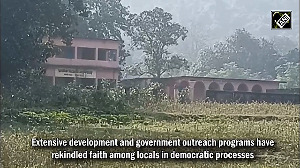The much talked about Right to Information Act came into force on October 12.
The Union government says the Act is revolutionary, as it opens all official departments across the country to public scrutiny.
The government also claims the new law will help it share power with the humblest, and empower the weakest.
But just what is this Act and how does it help you? Here's the lowdown:
What is the Right to Information Act all about?
It is a new law that the Indian government has enacted. It gives every citizen the fundamental right to seek information from any government department.
The Act aims to promote openness, transparency and accountability in governance.
What kind of information can people access under the Act?
Information, as per the Act, includes records, documents, file notings, memos, e-mails, opinions, advices, press releases, circulars, orders, logbooks, contracts, reports, papers, samples, models, data and material held in any electronic or printed form.
What was the need for such an Act?
Information is indispensable for the functioning of a true democracy. The right to know is closely linked with other basic rights like freedom of speech and expression and right to education.
In a country like India, availability of information to the people needs to be assured in the fastest and simplest form possible.
The advocates of the Act argue that free flow of information from the government will not only create an enlightened and informed public opinion, but also render those in authority accountable.
According to former attorney general Soli Sorabjee, "Lack of transparency was one of the main causes for all pervading corruption and Right to Information would lead to openness, accountability and integrity."
Was information hard to get before the Act?
Red tapism and an insensitive bureaucracy had often been the hurdles to getting information from the government. Often, the Official Secrets Act would be waved to deter information seekers.
How did the Act come about?
In the last decade, activists, rights groups and politicians have been campaigning for such a law. In Various activist groups formed the National Campaign for the People's Right to Information, to demand the legislation.
The Campaign, shepherded by activist Aruna Roy, was instrumental in the introduction of the Freedom of Information Bill in the Lok Sabha in July 25, 2000.
The bill was enacted as the Freedom of Information Act in 2002. But the Act retained a number of restrictive provisions to deny information to the public.
Will it change our lives?
The parameters of the new law are amazing by any stretch of imagination. If used with zeal, this Act will make the real difference to way we live and behave in public and the way we use, misuse and abuse public money.
Perhaps the words of a Delhi-based lawyer best sum up the benefits of the Right to Information Act: "Stretch your imagination as much as you can. You can ask any question to the government and get information and eventually make the government accountable."
Says Roy, the pioneering activist behind the Act: "Every citizen of the State has a fundamental right to say, 'You are spending my money. Render me the accounts.'"
How does the law help us?
First, besides serving the high ideals of democracy and humane society, this Act will make Indians more powerful because information is power in today's world.
Second, the Act will also strike at the roots of corruption because corruption breeds in secrecy and multiplies faster at places where accountability is less or nil. When corrupt bureaucrats, politicians and contractors know the law can catch them, they will think hard before indulging in blatant corruption. At least, now alert citizens can slow down corrupt officers and politicians.
Third, Indian politics will hopefully mature as more information passes through the hands of political rivals, police, judiciary, media and the people. The Act will reveal who is exploiting whom and how one can get justice for the poor and the needy. The judiciary will now have better data to decide against the corrupt.
That sounds so far flung, doesn't it?
Let us start from the district level. If the road leading to your town is washed out in the first rains of the season, you might like to ask who was given the contract to build that road, at what price and what the terms and conditions were.
Was the contractor related to a member of Parliament or a member of legislative assembly in that area?
During the building of that road, did any government officer object to any deficiency or malpractice?
Was there any communication in this regard?
The concerned departments will have to come up with answers in the stipulated period.
Some panchayats are run by local goons or the community caste heads. They bully people when someone raises questions of accounts and money spent. The sarpanch or development officers are rarely forthcoming. Now, all resources and their distribution will have to be transparent on paper.
Who will be the immediate beneficiaries of the Act?
Journalists.
They will be able to report many more stories. The media can now think about questions they have never asked to the government -- because now, the government is bound to answer. And if the watchdogs of democracy get more teeth, it will put corrupt officers in a tighter spot than before.
Is there a mechanism in place to implement the Act?
Yes. The government has formed a Central Information Commission.
Wajahat Habibullah, who retired as a secretary to the Government of India, has taken charge as India's first Chief Information Commissioner.
Recently, he wrote: 'The Right to Information Act of 2005 will guarantee the other essential elements of good governance: transparency and accountability.'
Does the Act mean you can access any government paper?
No. An overly broad exemption has been included for 'Cabinet papers, including records of deliberations of the council of ministers, secretaries and other officers.' A number of central intelligence and security agencies are specifically and entirely exempted from the Act, except where the information request pertains to allegations of corruption or human rights violations.
How does one go about exercising the Right to Information?
The government has set up a procedure to get information. Citizens have to pay Rs 10 as application fee, Rs 2 per page of A4/A3 size paper on which copies of information are received, and Rs 50 per floppy diskette. Inspection of records for the first hour is free, but citizens will have to pay Rs 5 for every 15 minutes of subsequent time.
Also see:
What you should know about Right to Information Act





